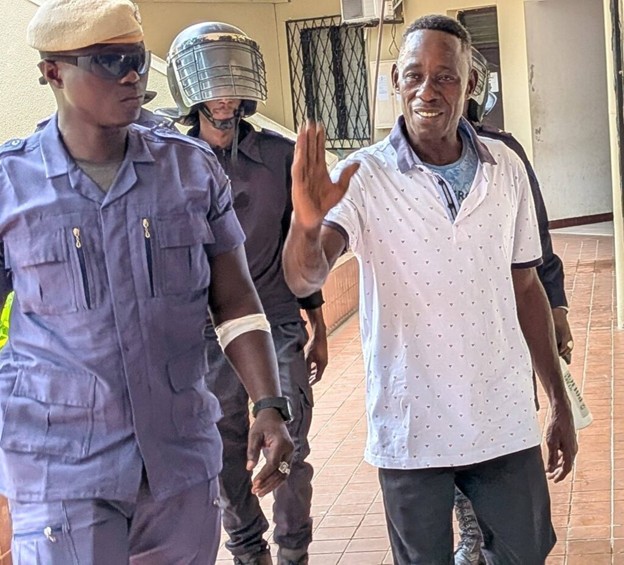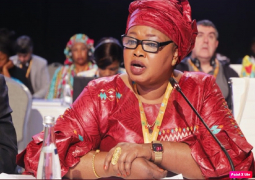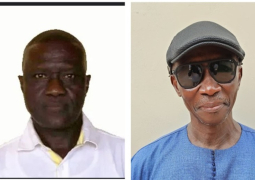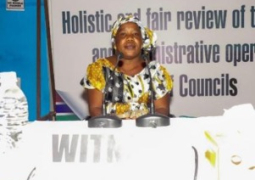
When the case was called yesterday, State Counsel S.L. Jobarteh appeared for the prosecution, while defence counsel Lamin J. Darboe represented the accused.
Leading the witness in his testimony, Jobarteh asked: “You said the accused person said a lot of things, including that he was among the people who burned the APRC bureau?” Conteh responded affirmatively.
Asked to explain how the accused was apprehended, Conteh told the court: “The accused was arrested at Banjul International Airport while attempting to leave the country. He was arrested by plainclothes officers who had been searching for him at the airport. Once they identified him, he was taken into custody and transported to the Airport Police Station, before being transferred to the Brusubi Police Station.”
Conteh added that Sanyang remained in detention at Brusubi until the following day, when he was moved to Police Headquarters in Banjul.
When asked to name the members of the police panel that investigated the matter, Conteh said: “I can’t remember everyone, but I know the panel was headed by Commissioner Jawara. It also included Inspector Gibba, Cadet Inspector Alieu Jallow, Corporal Binta Kujabi, and others.”
Explaining the purpose of the panel, Conteh stated it was convened to engage with the accused regarding statements he made during an interview with journalist Peter Gomez of West Coast Radio. “We sat with the suspect, introduced ourselves, and made him comfortable. He was asked questions specifically about the interview with Peter Gomez,” Conteh said.
He further testified that Sanyang appeared to be in good condition during the interaction, but disclosed that he had undergone surgery involving a metal implant in his back following an accident, and was experiencing leg pain. “He pleaded with us not to detain him on the floor, saying it was too dry,” Conteh added.
On the issue of Sanyang’s reference to the court as ‘clandestine’, Conteh said the accused cited the Sukuta incident as an example, questioning why the Inspector General of Police and the court had failed to bring the alleged culprits to justice. “Sanyang told us maybe something was being hidden,” Conteh testified.
Regarding the arson charge, Conteh told the court that Sanyang admitted to being involved in the burning of the APRC bureau—not physically, but by funding the act.
The prosecution then presented the cautionary and voluntary statements made by the accused, which were shown to Conteh in court. He confirmed their authenticity, noting that both documents bore his signature and were taken in the presence of an independent witness, Abdoulie Jawo.
At this point, State Counsel Jobarteh applied to have both statements admitted into evidence. With no objection from the defence. Justice Jaiteh accepted the application and the documents were formally tendered as exhibits in support of the prosecution’s case.
During cross-examination in the ongoing arson trial, Defence Counsel Darboe questioned the handling of the suspect’s medical condition by the police. Addressing the witness, Darboe asked: “Sanyang told you that he is not well, and you didn’t listen?”
The witness responded: “We did listen to him. However, he wasn’t speaking to me directly. At the time, the suspect was addressing Commissioner Jawara. Sanyang told us he was fine, as he had his medications with him in his bag.”
Counsel Darboe pressed further, stating: “I am putting it to you that you are misinforming the court. I was the one who called the Office of the IGP and informed them that the suspect needed his medications.” The witness replied: “I was the one who gave him the medications when I was instructed to do so.”
Darboe continued his line of questioning: “I am putting it to you that if a suspect tells you he has a medical condition, you need to address it before conducting any interview.” The witness conceded, “Yes, I agree. But that’s only when the suspect says he can’t move or do something. In this case, Sanyang was moving and doing things.”
When asked whether medical personnel were contacted to examine the suspect, the witness, identified confirmed: “I and others went to the prison. We met the Commissioner of Operations of the Gambia Prison Service, who later called a doctor, and the suspect was examined.”
Turning to the substance of the charges, Darboe asked, “Conteh, the accused person is charged with arson. Have you established whether he was in the country at the time?” Conteh replied, “The suspect told us he was the one who funded the burning of the APRC bureau, but he was not in the country at the time.”
Darboe followed up, “Did you ask the suspect to provide his passport so you could verify whether he was in the country?” Conteh responded, “We didn’t ask, because he told us he funded the burning of the APRC bureau by sending money.”
Concluding his cross-examination, Darboe asserted, “I am putting it to you that the accused did not participate in the burning of the APRC bureau, and he did not fund it. The police didn’t do their job.” To this, the witness simply replied, “Ok.”




